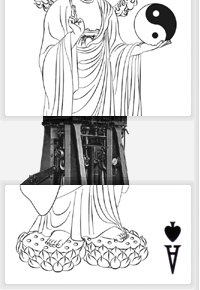適見在世中。奄去靡歸期。奚覺無一人。親識豈相思。
--陶淵明《形贈影》
上星期,道士兄告訴我一個黑人中槍的故事,我聽後覺得意味深長,便請他在這兒寫一寫。當時我們有很多胡思亂想,好像先由Samuel Johnson出發,途經列子,再一直拉扯到Albert Camus。現在道士兄既已守約把故事寫了出來,我也不妨整理一下當天的胡扯,再額外插點評論,以博讀者一哂。
道士兄說他跟朋友看到黑人喋血街頭後,居然還能氣定神閒、談笑風生地吃漢堡包,不禁詫異於自己的麻木不仁。我說:“你既不認識黑人,難道要為他守喪嗎?”接着我便說了Dr Johnson的故事。話說Johnson有位叫Baretti的朋友,因為謀殺而身陷囹圄,若罪名成立則勢必吊死。在受審前夕,Johnson跟 Boswell有以下對談,時為1769年10月19日星期四:
Talking of our feeling for the distresses of others; — JOHNSON, "Why, Sir, there is much noise made about it, but it is greatly exaggerated. No, Sir, we have a certain degree of feeling to prompt us to do good; more than that, Providence does not intend. It would be misery to no purpose." BOSWELL. "But suppose now, Sir, that one of your intimate friends were apprehended for an offence for which he might be hanged." JOHNSON. "I should do what I could to bail him, and give him any other assistance; but if he were once fairly hanged, I should not suffer." BOSWELL. "Would you eat your dinner that day, Sir?" JOHNSON. "Yes, Sir; and eat it as if he were eating it with me. Why, there's Baretti, who is to be tried for his life to-morrow, friends have risen up for him on every side; yet if he should be hanged, none of them will eat a slice of plum-pudding the less. Sir, that sympathetick feeling goes a very little way in depressing the mind."很精警的話,也一針戮破大家的虛偽:“yet if he should be hanged, none of them will eat a slice of plum-pudding the less. Sir, that sympathetick feeling goes a very little way in depressing the mind.”這句更絕,令人啼笑皆非:“Sir, here you have a specimen of human sympathy; a friend hanged, and a cucumber pickled.”在今天這個「道德」社會,我們都羞於承認人性的弱點,更遑論這樣大言不慚了。對自己都不老實的人,給我拖出去斬!
I told him that I had dined lately at Foote's, who shewed me a letter which he had received from Tom Davies, telling him that he had not been able to sleep from the concern he felt on account of "This sad affair of Baretti," begging of him to try if he could suggest any thing that might be of service; and, at the same time, recommending to him an industrious young man who kept a pickle-shop. JOHNSON. "Ay, Sir, here you have a specimen of human sympathy; a friend hanged, and a cucumber pickled. We know not whether Baretti or the pickle-man has kept Davies from sleep: nor does he know himself. And as to his not sleeping, Sir; Tom Davies is a very great man; Tom has been upon the stage and knows how to do those things: I have not been upon the stage, and cannot do those things." BOSWELL. "I have often blamed myself, Sir, for not feeling for others, as sensibly as many say they do." JOHNSON. "Sir, don't be duped by them any more. You will find these very feeling people are not very ready to do you good. They pay you by feeling."
六十四年後,英國史家Lord Macaulay在一封信中說了類似的話(To Hannah M. Macaulay, July 31,1833):
How very little one human being generally cares for another! How very little the world misses anybody! How soon the chasm left by the best and wisest men closes! I thought...that our own selfishness when others are taken away ought to teach us how little others will suffer at losing us. I thought that, if I were to die to-morrow, not one of the fine people, whom I dine with every week, will take a côtelette aux petits pois the less on Saturday at the table to which I was invited to meet them, or will smile less gaily at the ladies over the champagne. And I am quite even with them. (1)《異鄉人》(L'Étranger)的主角Meursault,在母親下葬當天,照樣抽煙、睡覺、喝咖啡,幾天後更若無其事和女孩游泳耍樂看電影--他不可能預料到,將來有檢控官會因而指控他:“我控告此人懷着罪犯的心,埋葬了一位母親。”(j'accuse cet homme d'avoir enterré une mère avec un cœur de criminel.)對於有居喪傳統的中國人來說,Meursault可謂極度“不孝”;而對於有高尚情操的香港人來說,Meursault就更是萬眾期待的“人辦”二世了。看來還是我們的至聖先師較有人性,因為他說“夫君子之居喪,食旨不甘”,且“食於有喪者之側,未嘗飽也”,可見他本身不但是孝子,更會垂憐喪者。我只是好奇,假如孔子也像道士兄般目睹陌生的黑人中槍,他那個漢堡包究竟是吃,還是不吃?To eat, or not to eat: that is the question.
注:
(1) 此書見G.O. Trevelyan, Life and Letters of Lord Macaulay, Longmans, 231-232。錢鍾書在《管錐編》P.239-241也曾討論過本文的主題,即親友雖死而己不廢食。有趣的是,錢老雖然也徵引Trevelyan這部傳記,卻只用了第546頁的話,卻好像忘記了我上面那摘自第232頁的引文,且更與Dr Johnson交臂失之,何不審也?這個小發現似乎可說明:錢老讀書雖多,但可能有不少也只是粗粗翻過而已。當然,生也有涯,這絕對是明智的讀法。



9 留言:
"直到一邊吃﹐才一邊討論剛才的事﹐就似閒話家常﹐也許夾雜了少許興奮﹐和看完電視劇或電影的反應差不多﹐有說有笑。台灣仔突然笑笑問了句:「我們是否很變態﹐我們剛看著某個人死﹐不影響食慾嗎?」我和其餘二人也笑著搖頭。"
Dr. Johnson有沒有拿朋友的死和苦難來"夾雜了少許興奮"地"閒話家常"呢?
"對自己都不老實的人",固然應"拖出去斬!"; 老實地拿別人的苦難來說笑助興, 還以此沾沾自喜的人, 便更應"閹完再拖出去斬!"了.
匿名者:
你的意見我完全理解,但我跟道士認識多年,他不見得是個幸災樂禍的人,至少,我不認為他這麼不堪。他說話比較誇張倒是真的,詞不達意就要閹,那麼九成男人都要做太監了。我會這樣理解:黑人之死肯定不會影響他的心情(換了是我也不會),而所謂「興奮」,也許只表示某種受血腥場面所刺激而喚起的情緒而已,不可視之為「快感」。至於所謂「閒話家常」,的確表現了他們的冷漠--但誰又不冷漠呢?我想,他們就只是冷漠罷了,似乎跟「拿別人的苦難來說笑助興, 還以此沾沾自喜」尚有些距離吧?當然,我不是道士肚中的蟲,還是讓他現身說法較好。
人是很現實的動物﹐就如911事件﹐不少第三世界或發展中國家的人民也在偷偷暗笑。人命是寶貴的﹐看來現實卻不認同這看法。我的寫法的確跟我的原意的確有少許出入﹐也不是幸災樂禍。想寫的是血腥的震憾比預期少得多﹐不過就算我看了哈哈大笑又如何?
相反anonymous你這樣提倡暴力的人﹐才是搞到打打殺殺的根源。什麼也看得不順眼﹐我講得未夠清楚就喊打喊殺﹐閹了我你的屁股可沒福享。
道士:
「相反anonymous你這樣提倡暴力的人﹐才是搞到打打殺殺的根源。」
你咁講,我都唔係幾好意思,因為實情係我「提倡暴力」(拖出去斬)在先,諗下諗下,我真係幾嗜血架。:P
u鄉下有所謂”解穢酒”,喪禮完結後,主人家會設席宴請親朋.送至親上山那天也有這麽一次經歷,當天在酒樓開了三桌,與席者雖不至歡聲笑語,但也絶無憂傷肅穆之意,一餐飯吃得甚是暢快...
這可以說是天地不仁人間無情,也可以說意識裡人人深諳他朝吾體亦相同,生存死亡並不由心,而是一種被動狀態?
題外話,看那則”皮篋教子”,不知各位又有何反應/看法?
對自己老實不老實﹐可是自己評﹐而相信世間鮮有因判斷自己對自己不夠老實而認為該死者。況者那便是自殺﹐雖說法律不容﹐不過尚有人決定如此(自殺)﹐我看別人又能奈何? 世間上多點人對生命重視﹐世間已可好點﹐少點戰爭。其實生死牽連到的話題實在太廣﹐教仔教到死﹐哈﹐可見世間荒謬。想到太多﹐今天忙﹐未能寫。
其實何不學莊生,鼓盆而歌。其實道士並非冷酷無情,只不過是「故能勝物而不傷」,境界高也。
這令我想起蘇曼殊的一首詩:「禪心一任蛾眉妬,佛說原來怨是親,孤簑雨笠歸去也,與人無愛亦無嗔。」我們對人愛,對人憐憫是否一定好呢?這值我我們省思。
真正看得穿生死的人不多,所以一講「境界」,就很有神棍味道了。老實說,道士和我所能做到的,大概就只是看透別人的生死,和豁達面對他人的不幸而已。
我真正想大家留神的,不是虛無的「境界」,反而是老實的冷漠。人不錯應該有同情心,但也要同情得有分寸,何謂分寸?這是人人不同的,你是什麼人就做什麼反應,一過火就是矯情,矯情得太多就陷於自欺,自欺之極,就會永遠喪失自己。地獄就是「心死」。
據法國箴言家La Rochefoucauld所言,為親人之死而哭泣,其實就是為自己而哭:我們悼念的,是死者對我們曾經有過的好感;我們哭泣的,是自己的益處、歡娛和所受的尊重遭到削弱。更有一副眼淚,剛流下便旋即乾掉:我們為了賺得多情善感的美譽而哭;為了得到憐憫而哭;為了得到別人的哭泣而哭;最後是為了避免不哭的羞恥而哭。
Maximes Morales,233:“Il y a dans les afflictions diverses sortes d'hypocrisie. Dans l'une, sous prétexte de pleurer la perte d'une personne qui nous est chère, nous nous pleurons nous-mêmes; nous regrettons la bonne opinion qu'il avait de nous; nous pleurons la diminution de notre bien, de notre plaisir, de notre considération. Ainsi les morts ont l'honneur des larmes qui ne coulent que pour les vivants... Il y a encore une autre espèce de larmes qui n'ont que de petites sources qui coulent et se tarissent facilement: on pleure pour avoir la réputation d'être tendre, on pleure pour être plaint, on pleure pour être pleuré; enfin on pleure pour éviter la honte de ne pleurer pas.”
Birgit,
關於皮篋教子,我也略有所聞。只覺得太荒謬了,由始至終都令人莫名其妙。把頑童關在書房,像萬斯同、沈子培幼時般,也許還可誘發他們讀書的興趣。但關在皮篋幹什麼?難道以為那是乾坤一氣袋,方便練九陽神功嗎?將來投胎,寧可選個窮爸爸,也不要揀個蠢爸爸。
發佈留言